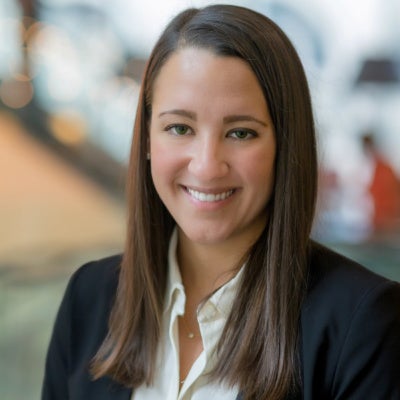When an emergent area of business is so new that there’s few existing rules of the road, what kind of strategy sets you up for success? For 2018 First Mover Samantha Reiss, the secret is engaging with every opportunity to learn—from challenging technical coursework to a smart digest of daily briefs to the eagerness of entry-level employees.

While the term ‘Big Data’ has settled into the status of something like a business buzzword, in reality the age of developing actionable insights from unstructured data has only just begun. In contrast to traditional data, such as hours and expenses that are easily structured in a database, ‘unstructured data’ refers to files such as web and email text, video and images—in other words, the majority of data we produce and exchange every day. As a Member of the Strategy and Corporate Development team at Bloomberg, L.P., Reiss is responsible for understanding the rapidly-changing data ecosystem to ensure Bloomberg’s existing and new businesses are well positioned for the future.
How do you want to grow as a professional through participating in the fellowship?
The First Mover fellowship presents an opportunity to experiment with communication, execution, and leadership styles. Specifically, I would like to develop my toolbox of tactics for navigating complex corporate environments and for spurring creative thinking within a large traditional institution. I hope to use the seminars to refine my ‘group presence,’ including driving but not dominating conversation, diagnosing tone and tempo of the audience, sizing up appropriate interjection points, and honing in on active listening. Most importantly, I am looking forward to learning from the experiences of our diverse and exceptional group of Fellows.
What issue(s) do you think will decide the future of your industry?
Data is king in the information services industry. I recently heard an astounding statistic that approximately 90% of the world’s data has been created in the last two years, and ~80% of that data is unstructured. Bloomberg is well positioned as a data provider at the heart of capital markets, but must be conscious that the financial services industry is changing around us, with fewer personnel and manual activities required and a greater application of robo-advising, algo-trading, and passive investing. The future of the financial services industry (the ‘winners’) will be those firms that can produce the best financial results with the most scale. These may be traditional financial institutions that are innovating, or new FinTech entrants, but in either case, the winners will need access to more data, quality data, proprietary data, with seamless delivery. The information services winners will be those who can adapt to the changing data landscape and provide these features in a scalable way.
What do you read, watch and listen for inspiration and insights in your career?
At the moment, I’m focusing extensively on building up technical awareness. I’m taking a quarter-long Bloomberg class called ‘Python for Data Science’ and (painfully!) attempting to self-guide my way through the ‘Foundations of Machine Learning’ course. While I don’t anticipate pivoting into an engineering role in the near term, every day I experience an increasing imperative to better understand the languages, constraints, and innovations of my engineering teams, and I find myself coming up with more strategic or creative solutions by thinking more like a technologist.
In terms of reading, I am a religious reader of a series of daily briefs: Fortune’s Data Sheet, Broadsheet, and Term Sheet, StrictlyVC, Crunchbase Daily, among a handful of general news briefs. I am constantly inspired by the ideas and persistence of the startup community and intrigued by the changing flows of capital in and out of industries, technologies, and services.
Lastly, I’ve made it a practice to carve out time to meet with entry-level employees and others at my firm who work in operational roles. With the former group, I’m re-invigorated by their fresh hunger “to do well and to do good” and impressed by the fascinating ideas that they have. With those in operational roles, I find it extremely valuable to understand the process that is involved with executing tasks and building workflows. On many occasions we’ve presented detailed strategic guidance leading up to a build versus buy decision, but what’s missing is the go-forward operational plan for the decision. Continuously learning from those on the ground has made me more conscious about downstream implications of strategic decisions and gives me a different perspective for how to tackle many of industry and business challenges.
Get to know the full list of the First Movers class of 2018 here

